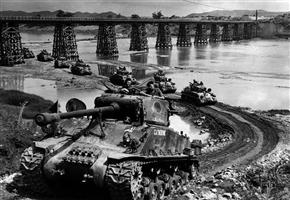Sunday, April 21, 2013
By Murray Brewster, The Canadian Press

VANCOUVER – It was one of those aching moments of clarity, interview gold that every author and historian hopes to achieve, one that said so much about how the Korean War was perceived in its time and the wounds it left for the people who fought it.
It is a story that sticks with writer Ted Barris, but belongs to Bill Jackson, who fought with the Princess Patricia’s Canadian Light Infantry.
He returned home to Brooks, Alberta to an empty train platform in October 1952 and when his proud father later introduced him at the local legion branch a voice from the back of the room told the young soldier to sit down.
“So you were in Korea? So what?”
The 516 who died in what the Liberal government of the day called a United Nations “police action” paled in comparison to the slaughter of the two preceding World Wars.
What was equally poignant for Barris, as he interviewed veterans of the Korean conflict, was how the echoes of the past could be heard today in the disenchanted voices of soldiers returning from a more recent forgotten war, Afghanistan.
The quiet, seemingly indifferent homecoming that Afghan vets received after the combat mission in Kandahar ended in 2011 struck an eerily familiar chord with Barris who has interviewed hundreds of veterans of various wars.
“There are interesting similarities,” Barris said in an interview Friday.
More than 40,000 Canadians served in the killing fields of Kandahar, many paying with their lives or parts of their bodies for their service. However, with the combat mission over, public recognition of their sacrifice has quickly faded.
Veterans Affairs Minister Steven Blaney and a group of surviving soldiers, sailors and airmen embarked Sunday on a journey to rediscover the unresolved war on the Korean peninsula, which has recently threatened into reignite in a new, and even more dangerous way.
Although the pointed threats coming from Pyongyang have eased somewhat of late, tension remains high as China, the U.S. and South Korea grapple for a diplomatic way to deal with Kim Jong-un’s hermit regime.
Jackson recounted his story to Barris on the eve of the Korean war’s 50th anniversary over a dozen years ago.
The sentiment that the 26,000 volunteers of the Canadian Special Force had not fought a real war ran deep in a country that was still exhausted from the Second World War and struggling to pay off the huge debt it left.
“There was absolutely no respect for what they went through,” Barris said of the Korean vets.
Doug Finney of Oshawa, Ont. served as an artillery signalman in Korea, and still remembers well the reception he received back home after putting his life on the line in a foreign land.
“I know when I came home and said I was in Korea, people would say, oh, was there Canadians in Korea?” said Finney, who’s president-elect of the Korean Veterans Association of Canada.
In his book, Deadlock in Korea, Barris chronicles the stories of the men who, after surviving the horrors and strain of war, often faced a new struggle to reintegrate into a society that was eager to forget the war.
It took Korean veterans decades to finally get the respect and recognition they deserved.
They had to fight to have the dates of their war carved into the national monument in Ottawa. Similarly, there is uncertainty over whether Afghanistan, which marks its formal end with the closing of the Kabul training mission next year, will find a place at the memorial where the nation mourns its soldiers.
The Harper government has done its part to scrub away the tarnish of indifference about Korea.
It proclaimed 2013 the year of the Korean veterans and last week announced the presentation of certificates to surviving members of the special force.
The federal delegation will visit just ahead of the 60th anniversary of the fragile armistice that ended three years of bitter, often fruitless bloodletting between United Nations forces and Communist troops.
They’ll visit Kap’yong, the scene of a desperate two day battle, where troops of the 2nd Battalion Princess Patricia’s Canadian Light Infantry held off a crushing Chinese Red Army advance between April 24-26, 1951.
“This is a truly important journey as we return to Korea to commemorate and say thank you to those who fought, and to those who died,” Blaney said at a reception Saturday night.